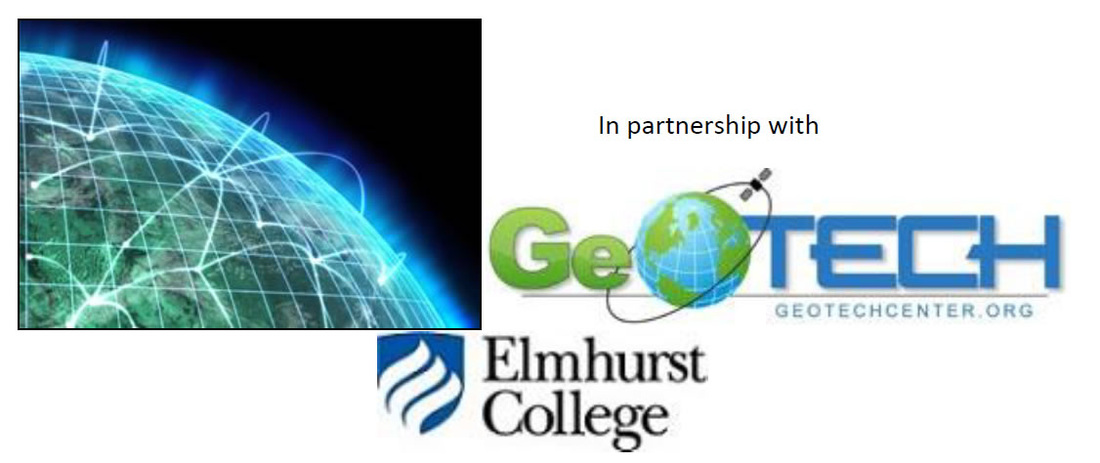Skills for the Digital Earth MOOC
|
MOOC
will be offered again from Oct. 26-Nov. 22, 2014
Contact Dr. Rich Schultz at [email protected] for additional information. |
Elmhurst College’s Skills for the Digital Earth MOOC is a
4-week, online course designed to introduce how location technologies are used
in society.
Ever stop to think about how important location is when using your smart phone? This educational MOOC begins with an elementary explanation of how society uses location in a myriad of disciplines. Geography, or rather, "where?" is important to all of us from various perspectives.
Within this MOOC, participants will learn what location technologies are used for, how the discipline developed and learn by doing via a series of scaffolded practical exercises. Online spatial software will be employed for any device using a browser which takes users through exercises and real world examples. It is appropriate for those with no prior experience with geographic information systems (GIS) software all the way to advanced users.
Skills for the Digital Earth will incorporate video lectures, interaction opportunities and discussion forums. Each module will feature a quiz and activities, and participants will receive a badge after each completed module to be used to demonstrate skills mastered. Instructions will be provided on the process of adding badges to your backpack in the course.
In this course, participants will:
Modules and Badges:
Module 1: Fundamental Geography
Badge: Fundamental Geography Knowledge and Skills
Module 2: Fundamental Computing Skills Associated with Geography
Badge: Fundamental Computing Skills of Geography
Module 3: Creative Thinking
Badge: Creative Thinking in Fundamental Geography
Module 4: Problem-Solving and Decision-Making in Geography
Badge: Problem-Solving and Decision-Making in Geography
Module 5: Geographic/Geospatial Tools and Technology
Badge: Geographic/Geospatial Tools and Technology
Module 6: Business Fundamentals of Geography/Geospatial Environments
Badge: Business Fundamentals of Geography/Geospatial Environments
Module 7: Abilities in the Geospatial Field - Advanced Digital Earth
Badge: Abilities in the Geospatial Field - Advanced Digital Earth
Completing the Course
LEAD INSTRUCTOR:
Ever stop to think about how important location is when using your smart phone? This educational MOOC begins with an elementary explanation of how society uses location in a myriad of disciplines. Geography, or rather, "where?" is important to all of us from various perspectives.
Within this MOOC, participants will learn what location technologies are used for, how the discipline developed and learn by doing via a series of scaffolded practical exercises. Online spatial software will be employed for any device using a browser which takes users through exercises and real world examples. It is appropriate for those with no prior experience with geographic information systems (GIS) software all the way to advanced users.
Skills for the Digital Earth will incorporate video lectures, interaction opportunities and discussion forums. Each module will feature a quiz and activities, and participants will receive a badge after each completed module to be used to demonstrate skills mastered. Instructions will be provided on the process of adding badges to your backpack in the course.
- March 30 to April 26, 2014 (4 weeks)
- Cost per student: Free
In this course, participants will:
- Demonstrate fundamental basic geographic concepts and be exposed to the geospatial workforce.
- Identify skills associated with the Geospatial Technology Competency Model (GTCM).
- Display creative thinking skills, problem-solving, and decision making in geospatial technologies.
- Use geospatial tools and technology and apply some business fundamentals using GIS.
- Recognize employment opportunities in the geospatial industry.
- Demonstrate the use of basic computer skills.
- Demonstrate the use of business application software.
- Demonstrate the use and interpretation of spatial data and data sources.
- Demonstrate the core geospatial abilities which are consistent with those of someone working in the geospatial industry.
Modules and Badges:
Module 1: Fundamental Geography
Badge: Fundamental Geography Knowledge and Skills
- Demonstrate and apply fundamental geographic knowledge and concepts.
- Use ArcGIS Online to navigate an online map and use skills learned to create a functional map.
Module 2: Fundamental Computing Skills Associated with Geography
Badge: Fundamental Computing Skills of Geography
- Successfully identify the skills of navigation online, including file management.
- Recognize geographic communication skills.
- Recognize skills associated with e-publishing, use of spreadsheets, presentation software, and use of databases.
- Identify skills associated with fundamental computing as a means of communication in the discipline of geography and geospatial technologies.
Module 3: Creative Thinking
Badge: Creative Thinking in Fundamental Geography
- Recognize logic, deductive/inductive reasoning and problem management skills.
- Recognize geographic reasoning skills.
Module 4: Problem-Solving and Decision-Making in Geography
Badge: Problem-Solving and Decision-Making in Geography
- Identify problem-solving and decision-making principles.
- Identify the effective use of solution implementation and alternative solutions to a spatial problem.
Module 5: Geographic/Geospatial Tools and Technology
Badge: Geographic/Geospatial Tools and Technology
- Recognize skills with gathering, storing, transforming, and manipulating spatial data to produce a desired outcome.
- Evaluate other open source software and data sources.
Module 6: Business Fundamentals of Geography/Geospatial Environments
Badge: Business Fundamentals of Geography/Geospatial Environments
- Identify the application of business fundamentals in several disciplines using GIS.
Module 7: Abilities in the Geospatial Field - Advanced Digital Earth
Badge: Abilities in the Geospatial Field - Advanced Digital Earth
- Describe the fundamental concepts and applications of GIS&T, including problems and challenges of representing change over space and time.
- Identify and describe the basic elements of cartography, including map interpretation, design principles, map projections, coordinates, and scale.
- Describe the fundamental concepts and applications of remote sensing and global positioning systems.
- Describe and discuss sources of data (including primary and secondary), the process of creating data, different data models (specifically, raster and vector models), and the fundamental concepts of data quality and uncertainty.
- Explain location-based services (LBS) and identify LBS applications.
- Describe the use of overlaying, buffering, and other analysis techniques to analyze spatial and temporal relationships.
- Discuss the need for ethics and professionalism in GIS&T.
- Explain datums, ellipsoids, and geoids.
Completing the Course
- Upon successful completion of Modules 1-6, participants will be issued a certificate of completion. Upon successful completion of Module 7, participants will receive an additional certificate.
- Module 1-6’s certificate of completion may be used as a waiver to GIS 100 Introduction to Geospatial Technologies, the first course in the Online Undergraduate Certificate in Geographic Information Systems at Elmhurst College.
- Module 1-7’s certificate of completion may be used as a waiver to AGS 500 Fundamentals of Geospatial Technologies, the first course in the Online Master’s Degree or Graduate Certificate in Applied Geospatial Sciences at Elmhurst College.
LEAD INSTRUCTOR:

Dr. Rich Schultz
- Associate Director of the National Geospatial Technologies Center of Excellence (Geo Tech Center)
- Associate Professor/Staudt Endowed Chair, Department of Geography & Geosciences, Elmhurst College
Content Creation/Development:
- Carmella Burdi, GISP – DuPage County, Illinois – Senior Analyst
- Judith Bock, Elmhurst College, Adjunct Faculty
- Dr. Joseph Kerski, ESRI, Education Manager
- Kevin Gibbs, Elmhurst College and University of Illinois-Chicago, Adjunct Faculty
- Ken Yanow, Southwestern College, Faculty and Geo Tech Center, co-PI and Associate Director
- Adam Dastrup, Salt Lake City Community College, Faculty and Geo Tech Center, Senior Personnel
- MOOC Direction: Dr. Donna Liljegren and Jen Propp, Elmhurst College School for Professional Studies
- Technical Assistance: Dr. Dean Jensen, Elmhurst College, Information Services and Jeff Geronimo, Elmhurst College School for Professional Studies
- Marketing: Lisa Trombetta, Elmhurst College School for Professional Studies
For further information regarding this MOOC or any of the programs in the Elmhurst College School for Professional Studies, please contact:
|
School for Professional Studies
Elmhurst College 190 Prospect Avenue Elmhurst, Illinois, 60126 (630) 617-3300 [email protected] |
For information regarding the National Geospatial Technology Center of Excellence (Geo Tech Center) or the Geospatial Technology Competency Model (GTCM), please contact the Geo Tech Center at:
National Geospatial Technology Center of Excellence
Jefferson Community and Technical College
1000 Community College Drive
Louisville, Kentucky, U.S.A. 40272
(502) 213-GEOT
[email protected]
National Geospatial Technology Center of Excellence
Jefferson Community and Technical College
1000 Community College Drive
Louisville, Kentucky, U.S.A. 40272
(502) 213-GEOT
[email protected]




